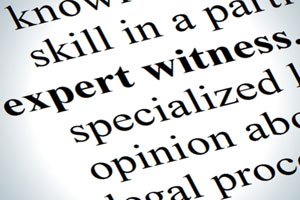The National Law Review has published an overview of social science studies that seek to answer the question of “what makes your expert witness the best expert witness?”
Purpose of the Overview
The overview was authored by Clint Townson, Ph.D., who works as a jury consultant at an expert witness search firm. Townson explained that when evaluating a potential expert witness, examining his or her credentials and experience is only half of the analysis. Towson noted that, especially when an expert is offering testimony on a complex issue, jurors tend to rely on heuristics such as credibility when evaluating expert testimony. Townson then reviewed some of the social science research on credibility, including knowledge, trustworthiness, dynamism, and likability.
Knowledge
Expert witnesses are primarily called to testify because of their knowledge, which includes educational credentials, publications, and experience. According to a 2012 study published in the Journal of the American Academy of Psychiatry and the Law, knowledge is also a product of “clarity in explanations, moderate assertiveness, and familiarity with the intricacies of the case.”
A 2010 study published in Behavioral Sciences & the Law noted that the best way for experts to show their knowledge is to act as teachers for the jury. Experts should aim to be consistent and coherent in their explanations, exhibit reasonable confidence in their own opinions, and demonstrate case-specific knowledge in addition to their general knowledge on the topic.
Trustworthiness
Perceived trustworthiness is a critical factor in whether a juror decides to believe an expert witness’s testimony. Experts who are patient and considerate teachers are likely to be perceived as trustworthy.
Eye contact is also important. A 2008 study published in Criminal Justice and Behavior examined the effects of eye contact on credibility and found that the expert witness’s ability to maintain eye contact with the attorneys and jurors had an effect on those expert’s credibility ratings.
Additionally, a 2000 study published in Law and Human Behavior found that the amount of pay, frequency of testifying, and level of credentials influenced jurors’ perceptions of expert’s believability.
Dynamism
Dynamism or charisma also play a factor in an expert’s credibility. According to a 2006 study published in Law & Social Inquiry, an expert’s ability to endear himself or herself to the jury is important, especially in cases where experts are asked to testify on complex issues. This can be accomplished through the use of simple terms or metaphors, the use of demonstrative examples, and remaining patient and composed through cross examination. In cases where jurors understand very little of an expert’s testimony, an expert’s dynamism combined with a show of passion for and knowledge of the subject matter may be the deciding factor.
Likability
A 1976 study published in Psychology found that likability has been tied to perceptions of trustworthiness and credibility as a whole. Jurors evaluate the likability of witnesses based upon their friendliness, the level of respect that they show, their use of informal language, and nonverbal behaviors including eye contact and vocal inflection.




